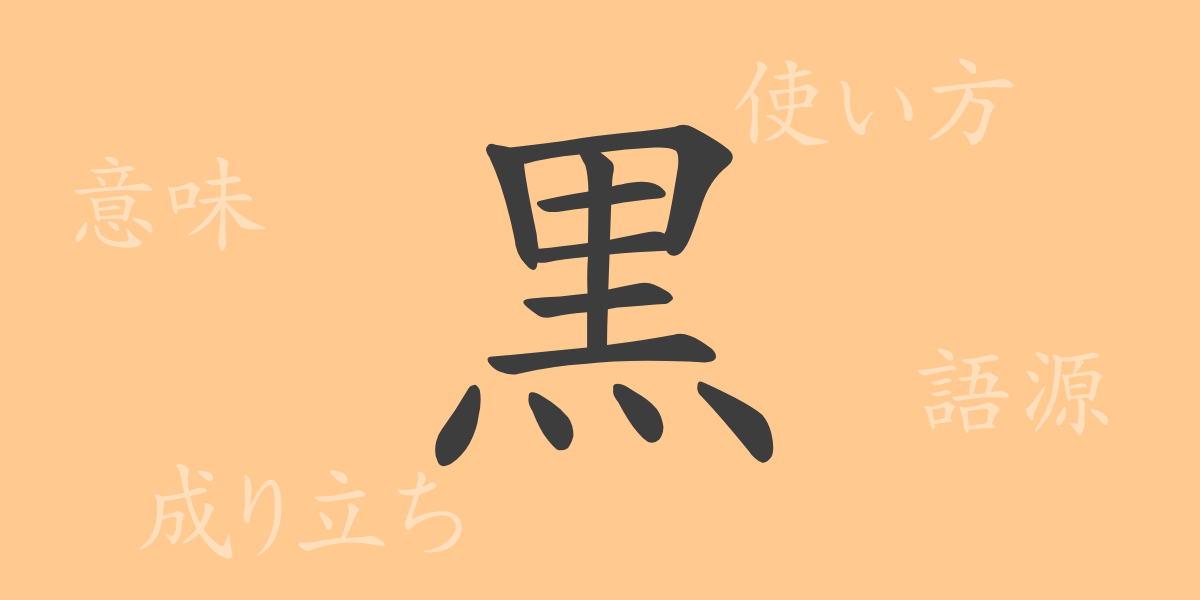Deeply rooted in Japanese culture and widely used in various expressions, the kanji “黒” (くろ, kuro) represents more than just a color. Its extensive usage encompasses a wealth of meanings, significantly influencing the daily lives and mental landscapes of the Japanese people. This article delves into the origins, readings, uses, idioms, and proverbs involving the kanji “黒” (くろ, kuro), exploring its profound world.
Origins of 黒(くろ, kuro)
The kanji “黒” (くろ, kuro) has its origins in ancient China. Initially a pictograph, it depicted the shape of fire surrounded by darkness. The soot left behind after the flames died down symbolized the color black. Over time, the character evolved into its current form, retaining its essence as the darkest color, “黒” (くろ, kuro).
Meanings and Uses of 黒(くろ, kuro)
Besides its primary meaning as a color, “黒” (くろ, kuro) is used metaphorically in various contexts. For example, “黒字” (こくじ, kokuji) denotes a financial surplus, while “黒幕” (くろまく, kuromaku) refers to a mastermind operating behind the scenes. Additionally, expressions like “黒い噂” (くろいうわさ, kuroi uwasa) hint at sinister rumors or suspicions.
Readings, Stroke Count, and Radical of 黒(くろ, kuro)
Let’s take a closer look at the readings and structure of the kanji “黒” (くろ, kuro).
- Readings: The on’yomi (音読み) is “コク” (koku), and the kun’yomi (訓読み) is “くろ” (kuro) and “くろ.い” (kuro.i).
- Stroke count: “黒” (くろ, kuro) consists of 11 strokes.
- Radical: The radical for this kanji is 黒部 (くろへん, kurohen).
Idioms, Phrases, and Proverbs Using 黒(くろ, kuro)
Numerous idioms, phrases, and proverbs incorporate the kanji “黒” (くろ, kuro), each with its own unique meanings and backgrounds. Here are a few examples:
- 黒字(こくじ, kokuji): A state of financial profit.
- 黒船(くろふね, kurofune): Refers to the American fleet led by Perry that arrived in Japan during the late Edo period.
- 黒板(こくばん, kokuban): A blackboard used in schools and other educational settings.
- 一寸先は闇(いっすんさきはやみ, issun saki wa yami): A proverb meaning that the future is unpredictable.
- 泥にまみれても黒くない(どろにまみれてもくろくない, doro ni mamirete mo kuroku nai): A saying indicating that even if someone appears dirty on the outside, their essence remains untainted.
Conclusion on 黒(くろ, kuro)
The kanji “黒” (くろ, kuro) transcends its role as a mere color descriptor, expressing a range of meanings and emotions. It plays a significant role in Japanese culture and language, intricately woven into the fabric of daily life. The words surrounding “黒” (くろ, kuro) reflect the history, culture, and even the lives of the people, showcasing the richness and depth of the Japanese language.

























